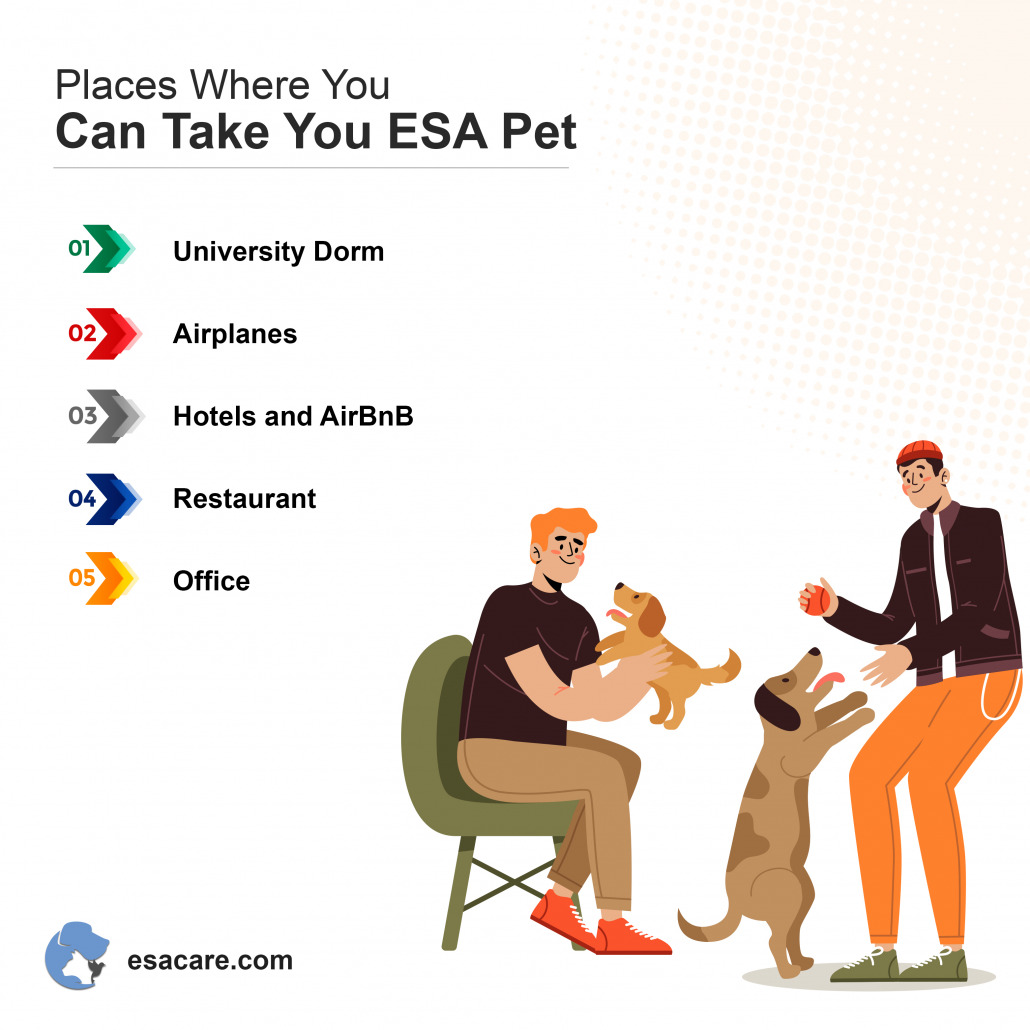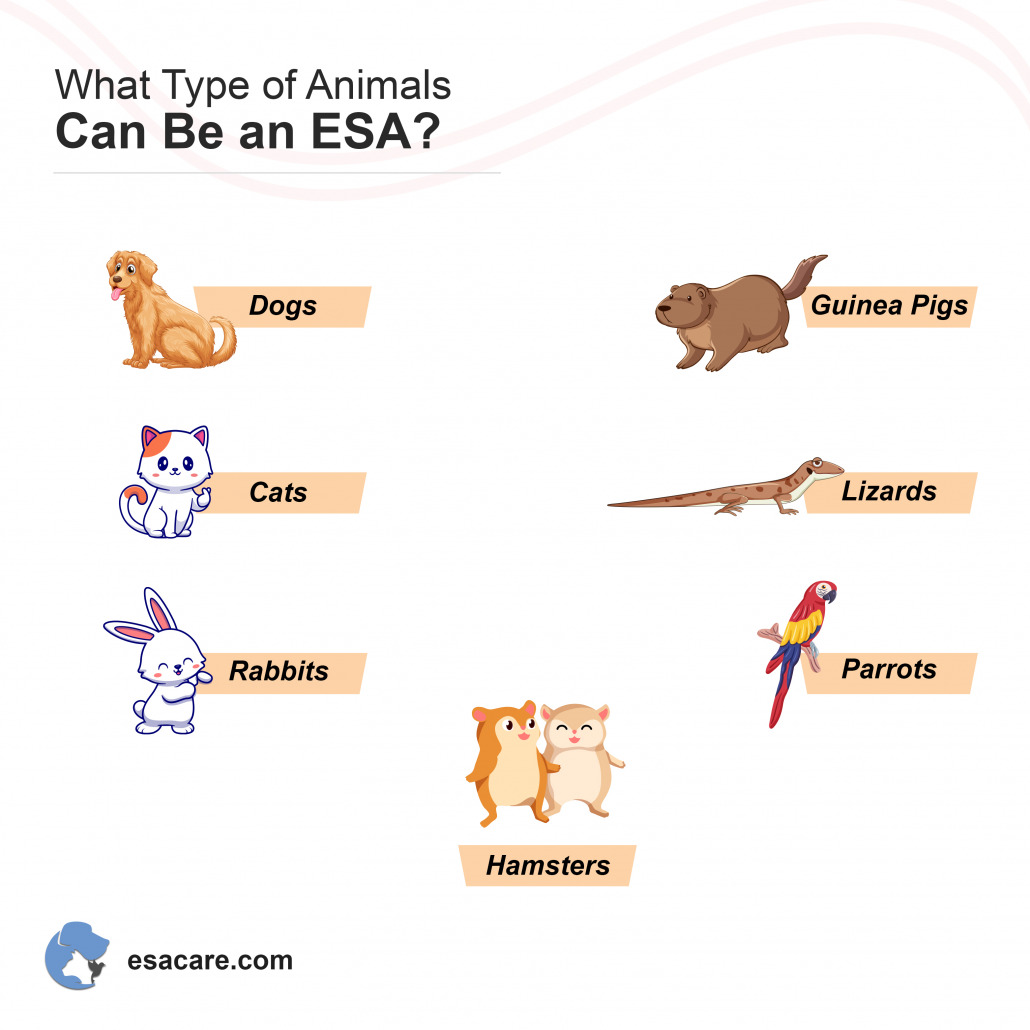Where Can I Take My Emotional Support Animal?
Travel with Your Emotional Support Animal
Emotional support animals (ESAs) are an important remedy that can help individuals who have been diagnosed with a severe mental or emotional disorder get their lives back on track. Despite the misconceptions that are often associated with mental health, there are effective treatments available. ESAs offer the comfort and support that is needed during these difficult times.
Traveling with your ESA has never been easier – Experience it through our services.
What is an Emotional Support Animal?
Emotional support animals are most often dogs, or cats but may also include any normally domesticated animal such as guinea pigs, rabbits, or even horses that have been prescribed by a licensed mental health practitioner (LMHP). As long as the animal’s purpose is not to be a pet but rather a companion that offers unconditional, nonjudgmental comfort, they might fit the description of an ESA. Unlike service or psychiatric dogs, ESAs are not trained to perform any job or physically assist their handler in any manner. Unfortunately, this distinction often leads to confusion and misunderstandings by the general public. Read more about ESACare and why to choose us.
Laws regarding pets
The ADA (Americans With Disabilities Act) was established in 1990 to give civil rights protections to individuals with disabilities like those provided to other protected classes such as race, sex, and religion. It guaranteed equal opportunity for individuals with disabilities in employment, public accommodations, transportation, state and local government services, and telecommunications.
Under the act, service animals are defined as a dog that is individually trained to perform a task or work for a person with a disability, and they are guaranteed protection in any place where the public is allowed. Because emotional support animals do not fit the definition as defined in the ADA, they are not considered a tool, and their protections are limited. However, due to the increased awareness of the benefits of such companionship and the mental health of patients, the federal government has chosen to include ESAs in two other important legal protections; the Air Carrier Access Act (ACCA) and the Fair Housing Act (FHAct).

ESA Pet
What is ACCA?
Patients who have been diagnosed with a mental or emotional disorder often find themselves withdrawn from society, which only strengthens the diseases hold on them. One of the benefits of emotional support animals is their ability to inspire their handlers to open up and become more involved in the world around them. These animals help keep patients calm in public and offer a stabilizing force when a particular situation becomes overbearing or makes them anxious. For many, traveling by air can be one of the most troubling times. For these patients, an ESA can help them work through any anxiety or panic that flying would typically cause.
Pets are not allowed in the cabins of planes and must be transported along with the baggage. The ACCA allows ESAs to travel with their handlers inside the cabin as long as the proper documentation has been submitted to the airline within a reasonable amount of time before flying.
Rules for traveling with an ESA:
A variety of service animals are allowed to travel in the cabin, but there are some exceptions
- Animals that are too large or heavy may be excluded
- Animals that pose a direct threat to the health or safety of others
- Those that cause a significant disruption of cabin service
- Airlines are never required to transport snakes, reptiles, ferrets, rodents, sugar gliders, and spiders in the cabin

Types of Animals
Documentation for air travel with ESA include:
- The traveler must have a mental or emotional disability that is recognized in the Diagnostic and Statistical Manual of Mental Disorders (DSM)
- The animal is an accommodation for air travel or an activity at the destination
- Individual providing the assessment is an LMHP, and the passenger is under their professional care
- LMHP’s license can be verified including the date and type of license, and the jurisdiction or state they are licensed is disclosed
- Documentation must be no older than one year from the date of travel
What is the FHAct?
Patients who require an ESA are also protected under the FHAct. While some landlords or rental agents have a strict no-pet policy, ESAs are exempt as well as protected from additional fees and penalties. ESAs must also be allowed to accompany their handler to any common area on the property. To qualify, tenants must submit an ESA letter to their landlord before bringing the animal onto the property.
Renew your ESA Letter with us – Click the button below.
Conclusion
Emotional support animals are a necessary part of the treatment regimen for many mental health patients. Learning when and where you can legally take your animal can be confusing if you don’t do your homework. Know your rights and have the proper documentation to support your case before a problem arises. ESACare can help you navigate this, and many other issues related to your disorder. Call today for a consultation. Get Your ESA Letter now!
Get your Emotional Support Animal Letter today by booking an appointment at ESACare.

Get Your ESA Letter









 347 5th Ave Suite 1402-112,
347 5th Ave Suite 1402-112,

Leave a Reply
Want to join the discussion?Feel free to contribute!